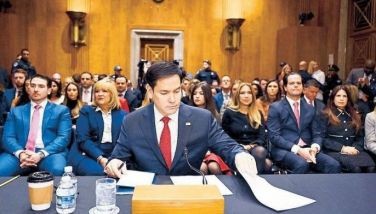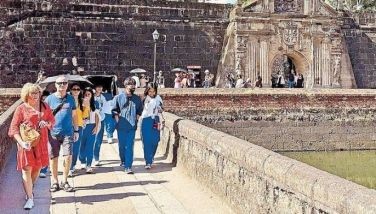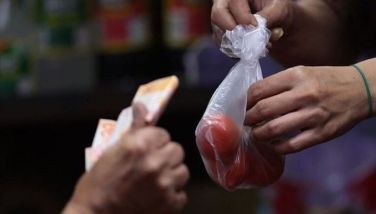Legacy pyramiding bared
MANILA, Philippines -- Speaker Prospero Nograles invested P18 million to P20 million in Legacy Group’s “buy-back double-your-money” scheme, which senators and officials of the Securities and Exchange Commission (SEC) have branded as a pyramid scheme or an illegal quasi-banking operation.
It was Legacy’s owner Celso de los Angeles, who is also Sto. Domingo, Albay mayor, who bared Nograles’ investment during yesterday’s Senate hearing on the current state of the pre-need industry.
Senators Manuel Roxas II, Francis Escudero and Senate President Juan Ponce Enrile gave SEC officials a dressing down for the industry’s travails and for not learning lessons from the earlier collapse of College Assurance Plan (CAP), a pre-need educational plan provider.
They said they could not understand why the SEC failed to see that the Legacy Group was engaged in a questionable scheme.
Based on De los Angeles’ business strategy, buyers of Legacy Consolidated Plans Inc. could sell the plan to Legacy Card, another company he owned, with a promise that the money would be doubled after a certain period of time.
De los Angeles claimed this was not a pyramiding scheme but an innovative way of raising capital.
Lawyer Hubert Guevarra, SEC director for Compliance and Enforcement Division, said the commission received complaints from investors that the Legacy Group was selling equities.
Guevarra said this was illegal because a pre-need firm was not allowed to do this. She said the SEC did not know about it.
Bangko Sentral ng Pilipinas (BSP) Deputy General Counsel Elmore Capule said “there was something anomalous” about the scheme because the company was getting money from the people without any assurance that the promised return would be given.
Capule said the scheme was “fundamentally unsafe and unsound” because the average earning that a bank could offer annually would be six percent for a deposit.
Capule explained that on the banking side, firms could not engage in high risk, high return investments but he said the BSP could not investigate the scheme because it fell under the pre-need firm of the Legacy Group.
De los Angeles said investors like Nograles were given post-dated checks to assure them that their money would be returned.
“He is a creditor. I still need to pay him (Nograles) at least P10 million,” De los Angeles said.
Harassment from BSP
During the hearing, De los Angeles blamed harassment from the BSP, negative media reports, extortion and the financial crisis for the Legacy Group’s setback.
He said a brother of former BSP Deputy Governor Alberto Reyes named Efren borrowed money from his banks and every time he would seek payment, a special auditing team from the office of the BSP official would arrive. He said Efren even promised to work for BSP’s approval of the merger of his banks in exchange for a consultation fee.
De los Angeles also said BSP Deputy Governor Nestor Espenilla Jr. always turned down his petitions, including the one seeking an increase in capital. He said Espenilla himself owns a bank and has different standards in dealing with bankers.
On learning of De los Angeles’ allegations, Espenilla said the BSP would hasten the filing of charges against the banker.
“There are no ifs and buts about it,” Espenilla said. “This is criminal banking activity, laws are being violated. The only thing holding us back is our ability to identify and provide the evidence.”
“Hopefully within this week or next, we will be able to file charges,” Espenilla said.
“These involve many institutions and persons. We will go by what is in evidence and then we will file charges,” he said.
“There’s a big difference between common knowledge and what people are saying and information that is usable in court,” Espenilla said. “That’s why we have to do our work painstakingly so we are able to get the results that we want.”
Global crisis blamed
Lawyer Juan Miguel Vazquez, Philippine Federation of Pre-Need Plan Companies Inc. president, blamed the global economic meltdown for the industry’s problems.
Vazquez said their trustee banks were assuring them in February of 2008 that their yield assumptions could be met, only to deteriorate rapidly in June or July.
SEC chairperson Fe Barin said the commission did freeze the assets of the Legacy Group when it filed for dissolution in December, but Parents Enabling Parents (PEP) coalition president Philip Piccio also blasted the SEC for not acting fast enough to address the problem.
He aimed his tirade at Guevarra and Jose Aquino, director of the SEC Non-Traditional Securities and Instruments Department.
Piccio said his group informed the SEC as early as 2006 of the Legacy Group’s travails.
Roxas, chairman of the Senate trade and commerce committee, chided officials of the SEC for their “willful negligence.”
“The weakest charge against the SEC is that it has been negligent. That’s the kindest assessment. They have been negligent, lazy and passive,” he said.
He also hit Barin for her statement that the SEC seeks to balance the interests of the pre-need plan holders with the concerns of the pre-need companies.
She likewise blamed supposed restrictions in the SEC Charter.
“I am really saddened by your response. You are washing your hands of responsibilities. The SEC has been given the widest latitude to regulate this. If you’ve seen the problem in 2005, then you should have analyzed this and stopped the sale of plans, but it continued,” Roxas told Barin.
“The SEC has been given ample power of regulation of pre-need firms. It is there to watch over these trust funds. But they seem to do nothing to protect the investing public,” Escudero, chairman of the Senate committee on banks, financial institutions and currencies, said.
PDIC to settle claims
The Philippine Deposit Insurance Corp. (PDIC) will start settling the claims of about 130,000 depositors of the failed Legacy group’s 13 rural banks next week.
According to PDIC president Jose Nograles, his agency will begin with those with deposits of less than P100,000, then those with P100,000 to P200,000 and finally those with P250,000, the maximum amount covered by the deposit insurance law.
He said the insurance claims of Legacy’s depositors amount to about P14.4 billion.
Nograles told a House hearing last Friday that PDIC has engaged a private auditing firm to examine the accounts in 50 branches of Legacy’s closed banks to try and determine which are fraudulent and which have been split in violation of the law.
However, he said it would be difficult to determine if one large account has been divided into small deposits so the depositors could go around the maximum amount covered by the deposit insurance law.
He said this is particularly difficult if the split accounts are in the names of different persons.
“In this case, we have to work with what we find,” he said.
The PDIC has requested a P14-billion loan from the Bangko Sentral ng Pilipinas to settle the claims of Legacy’s depositors.
Congressmen, however, said this could violate the PDIC charter, which provides that borrowings from the BSP should be for “insurance purposes” and not for paying off depositors.
Nograles is the brother of Speaker Nograles, who has been dragged into the Legacy controversy.
Former PDIC president Ricardo Tan claimed that Nograles, as House majority leader in 2005, had asked him to go slow on Legacy because its owner, De los Angeles, helped Vice President Noli de Castro in the May 2004 elections.
The Speaker dismissed Tan’s claims as inaccurate allegations, though he admitted taking up with him (Tan) the closure of a Davao bank from which he said his Davao City constituents were claiming their deposits.
In his opinion piece yesterday, The STAR columnist Boo Chanco revealed that Tan told him in May 2006 of his problems with then Majority Leader Nograles on Legacy and De los Angeles.
Chanco said he tried to verify this with officials of the BSP, but that none of them was willing to talk even on condition that they would not be named.
He also said Tan informed him that at the time, the Legacy banks’ accounts amounted to P6 billion only, less than half the more than P14 billion De los Angeles’ depositors are now claiming.
Tougher laws needed
Justice Secretary Raul Gonzalez said tougher laws are necessary to address the problems in the pre-need industry.
“This thing needs remedial legislation to see to it that this rehabilitation is done fast for the benefit of claimants,” Gonzalez told reporters.
“It should also be immediately determined if there is bad faith in the suspension of payments, as some pre-need firms may just be manipulating their status,” he explained.
“Problem with this pre-need industry is that we have to reckon with the Securities and Exchange Commission in the rehabilitation aspect because under the law, when you get bankrupt you can suspend payment because you’re not liquid,” he said.
“Under the Civil Code, pre-need firms can suspend payment if they’re already bankrupt but we cannot make use of that all the time to the disadvantage of small people,” Gonzalez stressed.
He also said a government bailout may not be the solution. – With Des Ferriols, Edu Punay
- Latest
- Trending
































